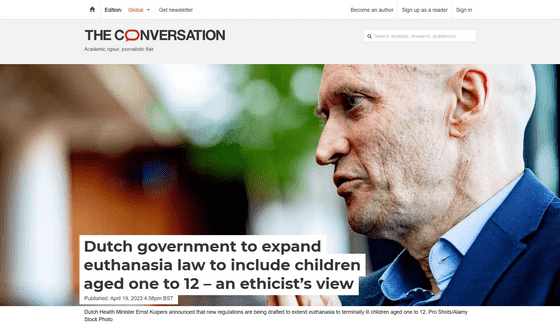Dutch government decides to extend euthanasia to 1 to 12 years old

Dutch Health Minister Ernst Kuipers has announced changes to regulations to allow doctors to actively end the lives of children aged 1 to 12 who are suffering unbearably from terminal illness. bottom.
Dutch government to expand euthanasia law to include children aged one to 12 – an ethicist's view

Dutch government to expand euthanasia laws to cover children under 12
In the Netherlands, euthanasia of people who met certain conditions triggered by the ' Postma Incident ' in which a doctor, Hertruida Postma, euthanized her biological mother with morphine after she had suffered from hemiplegia and tried to commit suicide by repeatedly falling out of bed. A law has been created to allow
Although the law made euthanasia illegal for patients under the age of 12, the guidelines allow euthanasia only for children under the age of 1 if the suffering is intolerable and certain conditions, such as parental consent, are met. is enacted. This rule is set out in a protocol called the Groningen Protocol, which was published in 2005.
These amendments extend the scope of the above principles to children between the ages of 1 and 12. The new rules are expected to come into force from late 2023.

Expert opinions on the Groningen protocol vary.
However, in the Netherlands, there is an opinion that the Groningen Protocol is a 'slippery slope', that is, a 'dangerous principle whose scope of application may be expanded once it is approved', and there are voices that caution should be exercised in discussions. increase.
However, since 2007, only two reported cases involving the procedure in children under the age of one have been reported.

According to the government, 5 to 10 children a year may be subject to the expanded Groningen protocol. Treatment is reserved for children as a 'last resort' and is used only when it is recognized as the only reasonable option to end the child's hopeless and intolerable suffering.
However, it has been reported that the Groningen Protocol does not include enough provisions to legally protect doctors, and doctors may be reluctant to perform the procedure. 'The proposed rule is not clear enough and will deter doctors who fear being prosecuted for performing this procedure,' argues Susanne van de Bathhorst, a professor at the University of Amsterdam. bottom.
Health Minister Kuipers said: ``I hope this change will bring some peace of mind to Dutch families. After intensive consultation, we are pleased that we have reached a solution that can help terminally ill children, their parents and their doctors.'
Related Posts:
in Posted by log1p_kr







